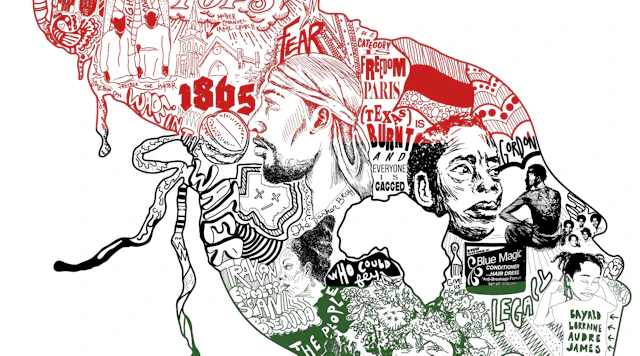Human Rights Campaign Partners with Washington, D.C. Artist to Explore the Joy and Pain of Juneteenth
by Aryn Fields •

This Juneteenth, artist Nia Keturah Calhoun is calling for Black, queer celebration and reflection on what freedom truly means
WASHINGTON—Today, the Human Rights Campaign (HRC), the nation’s largest lesbian, gay, bisexual, transgender and queer (LGBTQ+) civil rights organization, announced a collaboration with Black, queer artist, Nia Keturah Calhoun (she/they). Together, HRC and Calhoun are unveiling a new art piece ahead of Juneteenth, the annual commemoration of the emancipation of enslaved Black people in the U.S. Calhoun is featured in a video that explores the significance of Juneteenth through their intersectional lens as a Black, queer person, and dives into their artistic process for the collaboration with HRC. The final artistic piece draws on the duality of beauty and pain associated with Juneteenth and the American Black experience—it will also be released on a T-shirt for a limited time.
Juneteenth is a time for our country to reflect on our collective history, to consider how the legacy of slavery lives with us to this day and to fully acknowledge that Black Americans bear the brunt of institutional and systemic discrimination because of the role of white supremacy in our nation’s past, and present. By celebrating this holiday, which also takes place during Pride Month, we aim to lift up the lived experiences of Black, queer Americans—and treat it with the weight, significance and power that it deserves. This Juneteenth, and at all times, I am proud to help share the platforms of the Human Rights Campaign to lift up powerful messages like the one in artist Nia Keturah Calhoun’s piece."
Calhoun’s illustration includes imagery from their childhood and family to reflect the significance of generational growth and love. In contrast, the piece also includes images of the Mother Emanuel AME Church, the site of the 2015 white supremacist shooting of a Black church community, and the Tops Supermarket, the site of the recent white supremacist attack on a majority Black community in Buffalo. The dichotomy reminds the viewer of the ever-present feeling of not knowing if you are safe as a Black person in the U.S. Calhoun is a multidisciplinary artist whose work examines Black community maintenance, spiritual practices, joy throughout the diaspora, and offers commentary on Afro-Presentism and Afro-Futurism. Calhoun has exhibited in New York with the Smithsonian Asian American Center and in Johannesburg at the Ants Gallery. The Juneteenth art is available to be purchased here and all proceeds will go to Calhoun.
There is so much trauma. There's so much pain, but the joy of the presentism of being what Black is—yes, there are people who hate me because of what I am, and sometimes that's Black, and sometimes that's queer, and sometimes that's both, but all I can do is live my life with joy and love and refuse to be scared, even though they want me to be."
In 2020, HRC Foundation released a report ‘Black LGBTQ+ People and Compounding Discrimination.’ This report uses data from the 2020 Black LGBTQ+ Community Survey, a national survey of Black LGBTQ+ adults in the United States, and employs an intersectional statistical model to demonstrate the prevalence and impact of compunding discrimination in education, employment, healthcare, housing and public accommodations. The report found that 24% of Black LGBTQ+ adults experienced sexual orientation-based discrimination as a customer in a store, bar or restaurant in the three years prior to the survey. Additionally, 46% of Black transgender adults experienced gender identity-based discrimination as a customer in a store, bar or restaurant in the three years prior to the survey.
As we approach Juneteenth, we are reminded that freedom for Black people has always been complex in America—with a vast disparity between legislative freedoms and lived experience. As a queer, Black woman, the regulation and fragility of my civil rights have been ever-present—while unabashed and explicit in new ways, the fragility of freedom for Black people is not new, especially at the intersections of other marginalized identities. Juneteenth though is rooted in celebration, which is critical, despite this complexity, because a central element of Black resilience and resistance has always been Black joy. The ability to find moments, even at the bleakest of times to celebrate, rejoice, and lift up one another has been what has sustained marginalized communities for centuries.”
Contact Us
To make a general inquiry, please visit our contact page. Members of the media can reach our press office at: (202) 572-8968 or email press@hrc.org.
Love Conquers Hate
